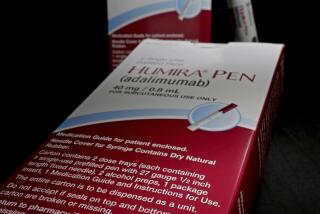Aspirin Can’t Cure Bayer’s Aches
- Share via
LEVERKUSEN, Germany — Aspirin made Bayer famous more than a century ago, and its Cipro remedy against anthrax cast it in the limelight again last year, but pharmaceuticals caused the German conglomerate’s worst annual performance in a decade.
Walloped by the summer recall of its most promising product, the Baycol cholesterol- lowering pills bought by 6 million consumers worldwide, Germany’s biggest drug maker saw share values tumble about 36% in the last year, and stock dividends have been cut from $1.40 to 90 cents.
In a confirmation of long- expected bad news for shareholders, Bayer Chief Executive Manfred Schneider on Wednesday called last year’s numbers “sobering.”
He promised a quick turnaround and higher net income this year, primarily through divesting non-core assets and through cost reductions in all four corporate divisions.
Bayer was hit in 2001 with a series of blows, notably a U.S. probe into the purity of its Kogenate treatment for hemophiliacs and slumping sales in its polymer and chemicals divisions inflicted by the global recession. Even the late-year surge in demand for Cipro, its best-selling pharmaceuticals product, failed to save the sector from a catastrophic bottom line.
Bayer was forced to pull Lipobay, marketed in the United States as Baycol, when it was linked to muscle deterioration and the deaths of at least 100 users. The company faces a bevy of lawsuits and is effectively shut out of the lucrative cholesterol treatment market. The Baycol withdrawal alone depressed sales by more than $600 million last year--the amount the company lost in net sales across the board.
Resistant to industry calls that it spin off its pharmaceuticals or merge them with a bigger global player, Bayer executives have chosen instead to undertake the most extensive corporate restructuring in a company history stretching back to the mid-19th century.
Schneider and Chief Financial Officer Werner Wenning, who will become CEO when Schneider retires next month, announced in December that Bayer would be transformed into four independent companies--health care, chemicals, polymers and crop science--under one management-holding umbrella by July 2003.
The reorganization is considered “the top priority for us at the moment,” Schneider told journalists at a news conference to disclose 2001 results. The company has 117,000 worldwide jobs, including 23,000 in the U.S.
Not all the company’s activities were in the doldrums last year. Executives say they expect approval from European antitrust authorities within a few weeks of the company’s $6.3-billion acquisition of Aventis CropScience, which would give Bayer a lead in that market. Analysts have speculated, however, that Bayer may have to pacify regulators by selling off or licensing certain products where it has more than a 40% market share.
Analysts have been urging Bayer for two years to divest itself of the pharmaceuticals business or find a partner with deep pockets.
“Fund managers would like to see them sell the pharmaceuticals business,” said Martin Roediger, an analyst with DG Bank in Frankfurt, while conceding that the company seems wedded to its traditional pursuit despite having fallen to 15th place in the highly competitive global drugs market.
Schneider has steadfastly refused to cede control of the division and the Bayer name that is synonymous with its most famous invention: aspirin. Schneider repeated Wednesday that his company is open to new “partnerships and collaborations” but that the Bayer brand name and cross logo would be retained in any new venture, as would the aspirin founder’s control of any emerging hybrid.
The CEO also said Bayer is taking the innovative step of empowering rival SmithKlineGlaxo to market its new impotence treatment, Nuviva, to challenge Viagra.
“We don’t feel we have the marketing potential worldwide,” Bayer’s international communications chief, Thomas Reinert, said in a recent interview at company headquarters in Leverkusen.
Bayer listed itself on the New York Stock Exchange in late January in a move aimed at gaining access to the world’s biggest capital market, Reinert said. Bayer shares lost value last year in the wake of the twin pharmaceuticals disasters with Baycol and Kogenate, as well as plummeting sales in polymers and chemicals used extensively in the auto-making and construction industries, which have been especially hard-hit by the global recession.
Schneider insisted that the problems with Kogenate are “almost entirely solved.”
“Our objective is to get 80% of our 2000 sales volume back this year,” North American communications chief Michael Preuss said of Kogenate, which was being produced at Bayer’s facility in Berkeley before a U.S. probe into the manufacturing process shut it down. Bayer had sales of $500million of the hemophilia treatment in 2000 but saw its turnover drop to virtually nil last year.
Bayer’s performance would have been even more devastating last year if not for sales of Cipro to a frantic U.S. public trying to gird itself against the spread of anthrax.
Although Bayer was eventually pressured by U.S. officials to lower its per-tablet price for Cipro from $1.77 to 95 cents, it still made a handsome profit.
“We didn’t lose money on Cipro, but it’s not justified to speak of windfall profits,” Reinert said.
Although Bayer’s economic problems are daunting, the company’s troubles don’t stop at the bottom line. As an active manufacturer in Third World countries with little or no environmental protections, Bayer has amassed a global network of critics, including Ralph Nader and the vocal watchdog agency in neighboring Cologne, the Coalition Against Bayer Dangers.
“Few companies in the world have developed such a bad reputation as Bayer, yet they seem oblivious to criticism or public pressure. Their usual reaction is to sue their accusers rather than address the problems,” said the coalition’s spokesman, Phillip Mimkes.
He recalls that Bayer was one of the last German companies to be pressed into contributing to a $5-billion industry-government fund to compensate World War II-era slave laborers, although the company was an eager beneficiary of conscripted workers.
Nader’s Multinational Monitor in January ranked Bayer one of the world’s 10 worst companies, based on its environmental and trade policies, an accusation Reinert described as frivolous and unfounded.
More to Read
Inside the business of entertainment
The Wide Shot brings you news, analysis and insights on everything from streaming wars to production — and what it all means for the future.
You may occasionally receive promotional content from the Los Angeles Times.










